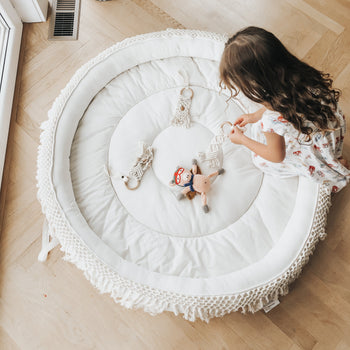5 Eco-Friendly Parenting Habits
When you bring a baby into the world, it’s only natural to worry about their future, especially in a world full of fear around climate change. Even simple tools that make a parent’s life a little easier, like disposable diapers or mass-produced toys, have long-term environmental effects. You do not have to do EVERYTHING, just some small little changes can make a big effect over a lifetime. Below are five eco-friendly parenting habits that you can start as soon as today.

The good news is that you can support the change and advocate for a better world. Plus, it’s pretty easy to incorporate small habits that help the planet and provide a healthier environment for your kids.
Ready to explore ideas that protect both the planet and your little ones’ future? Keep reading and learn how to become an eco-friendly parent!

1. Avoid Plastics in Toys
Toys that contain plastic may be more durable, but they often contain harmful chemicals like phthalates and BPA. These may get into your baby’s system since they love to put everything in their mouth.
The good news is that you have plenty of non-toxic baby toys alternatives. Wooden toys, for instance, offer a safe and sustainable option while still being fun and engaging for children. They’re usually free from dangerous chemicals, biodegradable after use, and made from renewable resources like sustainably harvested wood.
Silicone-based options are another eco-friendly choice that is gaining popularity. Silicone is flexible yet safer than traditional plastics because it doesn’t release toxic substances when exposed to heat or sunlight.
2. Support Local and Organic Food Producers
Locally grown, organic foods are some of the safest ways to feed your baby nutritious meals once it’s time to diversify their diet. Organic foods are not exposed to harmful pesticides and chemicals commonly used in conventional farming.
For kids especially, avoiding these toxins promotes better long-term health outcomes during their development years. Plus, buying local supports small-scale farmers working hard to implement sustainable growing practices.
You don’t need a complete diet overhaul either - start with small swaps like locally sourced fruits or eggs and meat from pasture-raised hens. Find the products your baby loves the most and buy them in bulk for a discounted price.
3. Take Care of Your Health
As a parent, it’s only natural to prioritize your children’s needs over your own. But taking care of yourself is one of the most important things you can do for your family.
Quality healthcare plays a huge role in maintaining your general well-being. Regular check-ups and preventive measures help catch potential issues early, ensuring small problems don’t become major concerns.
For instance, if you’re facing something as serious as a cancer diagnosis, quality cancer care that’s accessible via Medicare may save your life and your children’s future. When you receive proper medical care, you can actively participate in your family's lives.
But you shouldn’t think about your health only in extreme situations, like a cancer diagnosis. When you eat balanced meals and stay physically active, you set the foundation for lifelong wellness that both you and your children benefit from.
4. Opt for Reusable Products
Single-use items, like disposable diapers and wipes, are convenient but come at a significant environmental cost. These products fill up landfills quickly and take decades - or even centuries - to break down. Switching to reusable alternatives reduces waste while saving money in the long run.
Cloth diapers are one of the most impactful swaps parents can make. Modern designs include snap closures and leak-proof liners, making them far easier to use than you might think. They’re washable, durable, and often crafted from natural materials like organic cotton or bamboo.
5. Embrace Secondhand Gear
Kids grow quickly, and their needs evolve just as fast. From clothes to strollers, many essential items have a short shelf life in any family. Choosing secondhand items is an eco-friendly solution that reduces waste and saves money without sacrificing quality or safety.
Pre-loved baby clothes are often gently used since infants outgrow sizes within months. By purchasing from consignment stores or community swaps, you can build your child’s wardrobe sustainably while giving these items a second chance at life.
For larger gear like cribs, carriers, or high chairs, inspect pieces carefully to ensure they meet current safety standards. Reputable resale shops and online platforms specializing in baby goods often screen for recalls and offer reliable options.
Wrap Up
Small, mindful changes create lasting impacts. Together, these steps help nurture eco-conscious children and a healthier planet for generations to come. Every action matters!

















